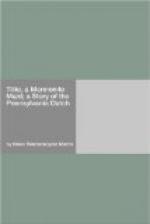A spiritually minded, thoughtful boy, of an emotional temperament which responded to every appeal of beauty, whether of form, color, sound, or ethics, Walter easily fell in with his uncle’s designs for him, and rivaled him in the fervor of his devotion to the esthetic ritual of his Church.
His summer vacations were spent at Bar Harbor with the bishop’s family, which consisted of his wife and two anemic daughters. They were people of limited interests, who built up barriers about their lives on all sides; social hedges which excluded all humanity but a select and very dull, uninteresting circle; intellectual walls which never admitted a stray unconventional idea; moral demarcations which nourished within them the Mammon of self-righteousness, and theological harriers which shut out the sunlight of a broad charity.
Therefore, when in the course of his career at Harvard, Walter Fairchilds discovered that intellectually he had outgrown not only the social creed of the divine right of the well-born, in which these people had educated him, but their theological creed as well, the necessity of breaking the fact to them, of wounding their affection for him, of disappointing the fond and cherished hope with which for years his uncle had spent money upon his education—the ordeal which he had to face was a fiery one.
When, in deepest sorrow, and with all the delicacy of his sensitive nature, he told the bishop of his changed mental attitude toward the problem of religion, it seemed to him that in his uncle’s reception of it the spirit of the Spanish Inquisitors was revived, so mad appeared to him his horror of this heresy and his conviction that he, Walter, was a poison in the moral atmosphere, which must be exterminated at any cost.
In this interview between them, the bishop stood revealed to him in a new character, and yet Walter seemed to realize that in his deeper consciousness he had always known him for what he really was, though all the circumstances of his conventional life had conduced to hide his real self. He saw, now, how the submissiveness of his own dreamy boyhood had never called into active force his guardian’s native love of domineering; his intolerance of opposition; the pride of his exacting will. But on the first provocation of circumstances, these traits stood boldly forth.
“Is it for this that I have spent my time and money upon you—to bring up an infidel?” Bishop Fairchilds demanded, when he had in part recovered from the first shock of amazement the news had given him.
“I am not an infidel even if I have outgrown High Church dogmas. I have a Faith—I have a Religion; and I assure you that I never so fully realized the vital truth of my religion as I do now—now that I see things, not in the dim cathedral light, but out under the broad heavens!”
“How can you dare to question the authority of our Holy Mother, the Church, whose teachings have come down to us through all these centuries, bearing the sacred sanction of the most ancient authority?”




